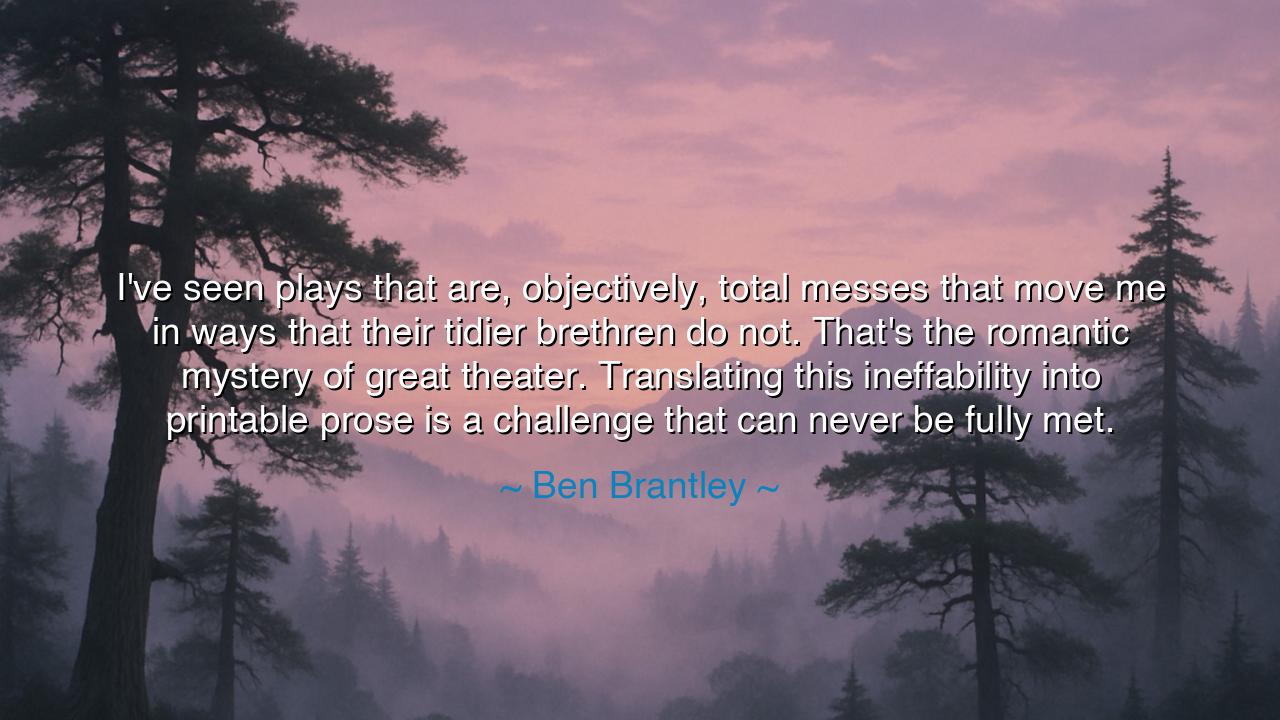
I've seen plays that are, objectively, total messes that move me
I've seen plays that are, objectively, total messes that move me in ways that their tidier brethren do not. That's the romantic mystery of great theater. Translating this ineffability into printable prose is a challenge that can never be fully met.






The words of Ben Brantley—“I’ve seen plays that are, objectively, total messes that move me in ways that their tidier brethren do not. That’s the romantic mystery of great theater. Translating this ineffability into printable prose is a challenge that can never be fully met.”—speak to the divine strangeness of art. He confesses that what moves the soul is not always what is neat, perfect, or polished. Often it is in the mess, in the raw, unguarded imperfection, that we find the heartbeat of truth. The critic here surrenders to the fact that there are moments in theater—flawed, chaotic, unrefined—that nonetheless pierce the heart with power that perfect craft alone cannot summon.
To call this the romantic mystery of theater is to acknowledge that art carries with it something irrational, something unmeasurable. The tidy play, carefully structured and executed with precision, may impress the mind but leave the heart untouched. Meanwhile, a play with jagged edges, stumbling dialogue, or unruly staging might erupt with such sincerity and passion that it overwhelms the spirit. This is the paradox of art: that perfection is not always what brings us closest to the truth. Rather, it is the ineffability of emotion, the spark of humanity shining through imperfection, that transforms the stage into something sacred.
History offers us mirrors of this truth. Consider the first performance of Beethoven’s Ninth Symphony, conducted by the composer himself though he was completely deaf. The orchestra faltered, the choir strained, and by technical standards, the concert was far from perfect. Yet those who were there spoke of being overwhelmed by a tidal wave of feeling. It was not the tidiness of the performance but its humanity—its imperfection combined with vision—that shook them to their core. In the same way, Brantley confesses that even a messy play can rise into greatness when it carries the fire of sincerity.
We also recall the plays of Shakespeare, which in their earliest productions were noisy, chaotic affairs, filled with interruptions from the groundlings and actors stumbling through lines. By the strictest measure of order, they were “messes.” Yet within that apparent disorder lay the fire of genius, lines of poetry that moved hearts across centuries. The majesty of Hamlet’s soliloquy, the aching sorrow of Lear, the passion of Romeo and Juliet—all emerged not from neat order but from the tumult of human voices on a raucous stage.
The meaning of Brantley’s words is profound: art cannot be reduced to formula, nor can its power be fully captured in words. Critics may strive to “translate” what they witness into printable prose, but they always fall short, for the essence of theater lies in its ineffability—that which cannot be explained, only felt. This is why theater, music, and poetry endure: they touch places beyond reason, places where logic cannot dwell. To admit this is not failure but wisdom, the wisdom of knowing that not all mysteries are meant to be solved.
The lesson for us is to embrace imperfection, both in art and in life. Do not think that only the polished and ordered things are worthy. Sometimes it is in the jagged, the unrefined, the stumbling and chaotic moments that truth reveals itself most clearly. Just as a flawed play can move more deeply than a perfect one, so too can our imperfect selves carry love, beauty, and truth more powerfully than any mask of perfection.
Practically, this means allowing ourselves to be moved without demanding explanation. If a song, a play, a moment of life brings tears or laughter, accept it as mystery rather than trying to dissect it. In your own work, dare to create boldly, even if the result is messy, for sincerity will shine more brightly than precision alone. And in your relationships, allow imperfection—knowing that love is often found not in flawless moments but in the raw, unpolished humanity of those we cherish.
Thus, Brantley’s words echo like a teaching for future generations: theater, and life itself, are not meant to be tidy. They are meant to be true. And truth often arrives wrapped in imperfection, moving us in ways we cannot explain. Let us not fear the mess, for within the mess lies mystery, and within the mystery lies the power that makes us most deeply human.






AAdministratorAdministrator
Welcome, honored guests. Please leave a comment, we will respond soon